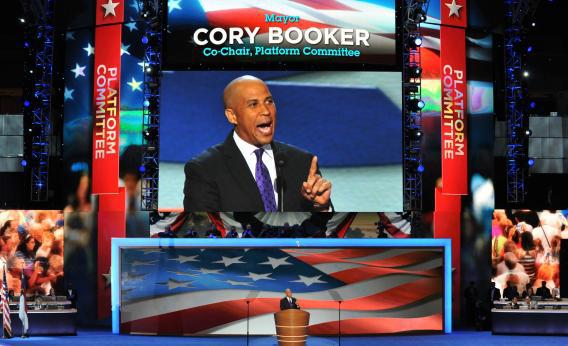[UPDATE: I’ve tweaked this a little because the references to the first piece, about Booker, way undersold the piece. Most of Booker’s complaints about it were baseless. I thought he had a little point about the piece’s kicker.]
The brief media bullying of Marco Rubio last night demonstrated one of politics’ iron laws: You’re either a hero or a mug. One minute Bob Menendez is a scrappy Cuban kid made good; the next minute he’s an obvious embarrassment to the Foreign Relations Committee, never ready for the job. One minute Chuck Hagel is the Wise Man of Republican Foreign Policy; the next he’s a muttering, friendless chump who crumples under questioning.
The New York Times is on it, with another great example of the iron law. In December, Kate Zernike—who previously covered the Tea Party and Republican party infighting—wrote an A1 story about how Newark Mayor Cory Booker’s image fell apart when you examined his city. The “Stanford- and Yale-educated son of the suburbs” had failed to live up to promise, with business leaders saying “he dazzles at news conferences but flags on the follow-through.”
“Even some fellow New Jersey Democrats,” wrote Zernike, “who believe that Mr. Booker is their best chance to oust Mr. Christie, a Republican, say he should run for Frank R. Lautenberg’s Senate seat in 2014, arguing that Mr. Booker is better suited to speechmaking in Washington than to governing a state.”
Well. Shortly after the story ran, Booker launched an exploratory committee for that Senate seat. Lautenberg will turn 91 the month the next Senate is sworn in, and a January Quinnipiac poll found only 35 percent of people favoring his re-election, with 71 percent of people saying age was a factor in their vote. But Lautenberg’s responded to the challenge by giving dishy, pissed-off quotes about how Booker deserves a “spanking.”
And so today, the cliched “wonderboy who doesn’t live up to the hype” story is chased by a cliched “old warrior ready for one more fight” story. Same reporter, also on A1. The poll that puts Lautenberg 21 points behind Booker in a primary is referred to this way:
A recent poll showed that most New Jersey voters approve of Mr. Lautenberg, but an even larger majority thinks his age makes another six-year term too difficult.
Left unsaid is that the poll gives Lautenberg a 42-32 percent favorable rating—plurality support, not support from “most New Jersey voters”—while Booker clocks in at 54-16 percent. (Lautenberg’s approval is at 50 percent.) Should political reporters rank the quality of candidates on close readings of snap polls? Hell no—ask President Rick Perry. But these stories aren’t even consistent on how they rate the candidates’ jobs performances. Lautenberg is a “night owl who enjoys the receptions of official Washington”—good! Booker “has made the rounds of the national media with his pledge to live on food stamps for a week”—bad! From A1 in December, we get this rating of Booker’s effectiveness:
Taxes have risen more than 20 percent over the past three years, even after the city laid off about 1,100 workers, including more than 160 police officers. Crime has risen, and unemployment is up. Schools remain under state control, and the city’s finances remain so troubled that it cannot borrow to fix its antiquated water system. While new restaurants have risen near the Prudential Center downtown, those in the outer wards were placed under a curfew this year because of shootings and drug dealing.
That’s good and harsh, even if the bit about crime could use a number or two. (Murders are down under Booker.) But today’s A1 rates Lautenberg’s current effectiveness not on what he’s passing but what he’s “fighting for.”
Mr. Lautenberg, a fighter dubbed “swamp dog” by a past opponent, has embraced his job with new vigor. He has taken a leading role on the issues of the day: fighting for recovery money for his hurricane-hit state and pushing for gun control after the shootings in Newtown, Conn.
As if Lautenberg had more to do with the funding than Chris Christie* and angry House Republicans? The A1 story in December ended with an anecdote about Booker’s callowness—one that the paper would partially correct. (The snooty-sounding book-reading at the end was actually about homelessness, featuring a Newark kid, part of a successful charity campaign.)
Mr. Booker was on his way to host a reading at a bookstore on the Upper West Side, filmed by C-Span. He then spoke at a benefit at Cipriani and attended a movie premiere at Google’s New York headquarters. Afterward, he announced on Twitter, “I sat on a panel with @Richard Branson last night for the premiere of this film about the failure of the war on drugs http://wayw.re/TGYU6Z”
Today’s A1 story ends with a rollicking story about Lautenberg being beloved at a north New Jersey party:
He was stopped twice by constituents, then veered, like a salmon swimming upstream, toward the lobby bar. As he made his third attempt to leave, 20 minutes later, he was stopped again, by two teachers. As the conversation turned to Newtown, he thumped his cane. “We have got to bring this country to its senses.” He moved on. More people stopped him. It was close to midnight, and Frank Lautenberg was only halfway to the door.
Had you read that sentence about Booker—and you could, because he’s incredibly recognizable—you’d scoff at the backslappy tone. Of course people at a Democratic Party event are eager to talk to their U.S. senator. Is there no way to get real about Booker’s record—lots of charisma and little victories, lots of setbacks—without venerating the other guy?
*originally mistyped “Booker” here
